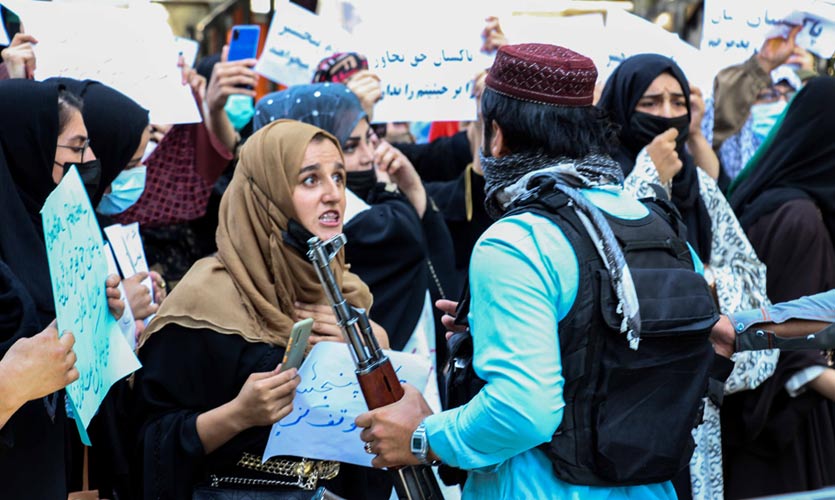It’s been two decades since the Taliban had control over Afghanistan during their 1996-2001 regime. A lot has changed since then, especially for the women of the land. Over the years, technology and social media have made it possible for people there to connect with others across the world. This privilege continues to be available to those with access and the know-how of technology, despite the clampdowns. When news of Kabul’s fall broke, international news channels were able to interview Afghan activists, holding space for their anguish, disappointment and fears. Quite a few of these voices were women.
Co-founded by Farahnaz Forotan and Ferdous Samim in March 2019, #MyRedLine is a social media campaign that aims to highlight and document Afghan voices about the conflict that the country has been going through for the last two decades. “A RedLine is a statement of an individual that they do not want it jeopardized, misrepresented and misused during the Peace Talks and beyond,” reads the campaign website. Packaged as a collection of short videos, the campaign aims to unite people and document their thoughts, virtually.
“I’m from new generation. I was t born to eat, sleep, and stay at home. I want to go to school. I want to do something for the develoment of my country.”
This is the unstoppable generation of #Afghanistan. pic.twitter.com/A0WasOO7Ux— MyRedLine – خط سرخ من (@myredline_afg) September 22, 2021
Afghan women across the world are using the hashtag #DoNotTouchMyClothes to share pictures of themselves in bright, colourful traditional attires. By doing so, they are putting forward a notion that breaks through the western way of looking at Afghanistan’s culture. There is so much more to their traditional clothes than just veils and solid black hues. They are also protesting the Taliban’s impositions on how women should dress in the country.
Proudly wearing in our traditional, colourful, vibrant Afghan clothes #DoNotTouchMyClothes #AfghanWoman #AfghanistanCulture #AfganistanWomen pic.twitter.com/WfC0McjKFH
— Fatima Kakkar, MD,MPH (@DrFatimaKakkar) September 13, 2021
Young boys are coming together to stand in solidarity with their sisters, who are being disallowed by the Taliban to attend secondary school. The narrative stands strong on these innocent shoulders, who want the Taliban to understand the importance of educating women in building a world worth living. They don’t want to be a part of such schools if education can’t be accessible for all.
Taliban has banned girls from secondary education in Afghanistan. Meanwhile, this brave young Afghan boys have joined a campaign: #WithoutMySisterIwillNotGoToSchool.
These are the people who’re taking enormous risks for change. #بدون_خواهرم_مکتب_نمیرم pic.twitter.com/o6qocRXauk
— Masih Alinejad 🏳️ (@AlinejadMasih) September 18, 2021
The diversity in these voices, some of which were even safely anonymous thanks to social media, was able to break through the clutter of politically motivated agendas. Having a voice can be empowering in a way that cannot be measured. This forms the foundation of what’s unique about the expression of resilience this time. Even if things can’t change on the ground, it is slightly easier to at least document the crisis in a way that infuses hope and assures that the struggles aren’t in vain. The world is watching, in a manner that’s as unfiltered as it could get.
Read more: Fates Of Women And Religious Minorities Under The Taliban










